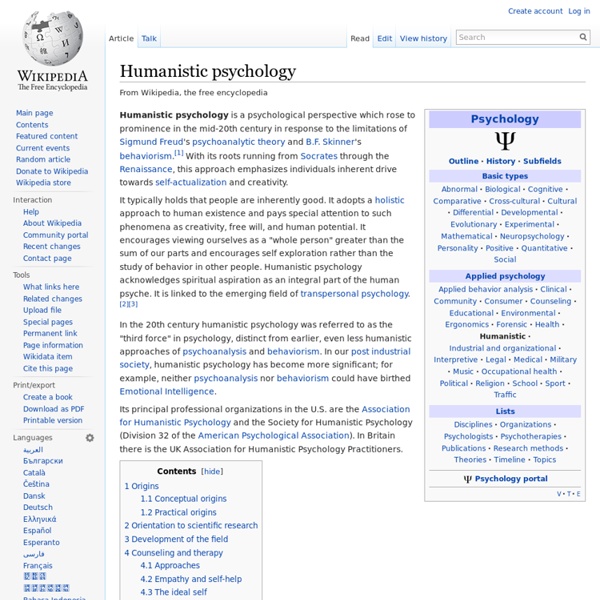



http://en.wikipedia.org/wiki/Humanistic_psychology
Related: Literature 3 essay • humanitiesExistentialism Here and Now Summer 1984 By Alfie Kohn TWENTY-FIVE YEARS ago, existentialism was a hot piece of intellectual property. Human Potential Movement The Human Potential Movement (HPM) arose out of the milieu of the 1960s and formed around the concept of cultivating extraordinary potential that its advocates believed to lie largely untapped in all people. The movement took as its premise the belief that through the development of "human potential", humans can experience an exceptional quality of life filled with happiness, creativity, and fulfillment. As a corollary, those who begin to unleash this assumed potential often find themselves directing their actions within society towards assisting others to release their potential. Adherents believe that the net effect of individuals cultivating their potential will bring about positive social change at large.
Lindisfarne Association The Lindisfarne Association (1972-2012) was a group of intellectuals of diverse interests organized by cultural historian William Irwin Thompson for the "study and realization of a new planetary culture". It was inspired by the philosophy of Alfred North Whitehead's idea of an integral philosophy of organism, and by Teilhard de Chardin's idea of planetization.[1][2] In his book Reimagination of the World, Thompson described his reasons for naming his group after Lindisfarne, an island with a famous monastery (once inhabited by Saint Cuthbert) just off the coast of Northumberland in the North East of England: "Although I used the word as a symbol of a small group of people effecting a transformation from one system to another, the word also brought with it the archetypical associations of a small group of monks holding onto ancient knowledge in a fallen world, a world that would soon overrun them during the Viking terror."[3] History[edit]
Web resources on consciousness, philosophy, and such Web resources related to consciousness, philosophy, and such. Compiled by David Chalmers Here are a small number of high-quality academic resources on the web that I find useful or interesting. The emphasis is on sites containing real intellectual content. See also my lists of people with online papers in philosophy and of online papers on consciousness.
New Documents Reveal How a 1980s Nuclear War Scare Became a Full-Blown Crisis During 10 days in November 1983, the United States and the Soviet Union nearly started a nuclear war. Newly declassified documents from the CIA, NSA, KGB, and senior officials in both countries reveal just how close we came to mutually assured destruction — over a military exercise. That exercise, Able Archer 83, simulated the transition by NATO from a conventional war to a nuclear war, culminating in the simulated release of warheads against the Soviet Union. NATO changed its readiness condition during Able Archer to DEFCON 1, the highest level. The Soviets interpreted the simulation as a ruse to conceal a first strike and readied their nukes.
Integral theory Integral theory, a philosophy with origins in the work of Sri Aurobindo and Jean Gebser, and promoted by Ken Wilber, seeks a synthesis of the best of pre-modern, modern, and postmodern reality.[1] It is portrayed as a "theory of everything,"[2] and offers an approach "to draw together an already existing number of separate paradigms into an interrelated network of approaches that are mutually enriching."[1] It has been applied by scholar-practitioners in 35 distinct academic and professional domains as varied as organizational management and art.[1] Methodologies[edit] AQAL, pronounced "ah-qwul," is a widely used framework in Integral Theory.
The Palm at the End of the Mind: Relatedness, Religiosity, and the Real: Amazon.co.uk: Michael Jackson In many societies, and for many people, religiosity is only incidentally connected with texts or theologies, church or mosque, temple or monastery. Drawing on a lifetime's ethnographic work among people for whom religion is not principally a matter of faith, doctrine, or definition, Michael Jackson turns his attention to those situations in life where we come up against the limits of language, our strength, and our knowledge, yet are sometimes thrown open to new ways of understanding our being-in-the-world, new ways of connecting with others. Through sixty-one beautifully crafted essays based on sojourns in Europe, West Africa, the United States, Australia, and New Zealand, and taking his cue from Wallace Stevens' late poem, "Of Mere Being", Jackson explores a range of experiences where 'the palm at the end of the mind' stands 'beyond thought', on 'the edge of space', 'a foreign song'.
Alexander Solzhenitsyn Biography Alexander Isayevich Solzhenitsyn was born on December 11, 1918, in the spa town of Kislovodsk in the North Caucausus mountains. His father, a former philology student at Moscow University, had died in World War I six months before his only son's birth. Alexander Isaevich, therefore, was born to a widowed mother in relatively indigent circumstances. Male gaze The male gaze is a concept coined by feminist film critic Laura Mulvey. It refers to the way visual arts are structured around a masculine viewer. It describes the tendency in visual culture to depict the world and women from a masculine point of view and in terms of men's attitudes.[1][2] The male gaze consists of three different gazes:[3][4]
Emergent Properties - International encyclopedia of the social and behavioral sciences 4 - Behavioral science - Деловая библиотека Back Emergence and emergent properties are concepts that are used across many scientific disciplines. They are the key elements of a theoretical and methodological tradition—most prominently represented in the 1920s—claiming that the whole is more than the sum of its parts. This amounts to saying that the properties of a whole (systemic qualities) cannot be deduced by summing or averaging the properties of its components (nondeducibility thesis).
Resources for the Study of Buddhism Resources for the Study of Buddhism Compiled by Prof. Ron Epstein Please send all comments, suggestions, and corrections to repstein@sfsu.edu. General BuddhismBuddhism for ChildrenTheravada Buddhist TeachingsMahayana Buddhist Teachings Buddhism and Science